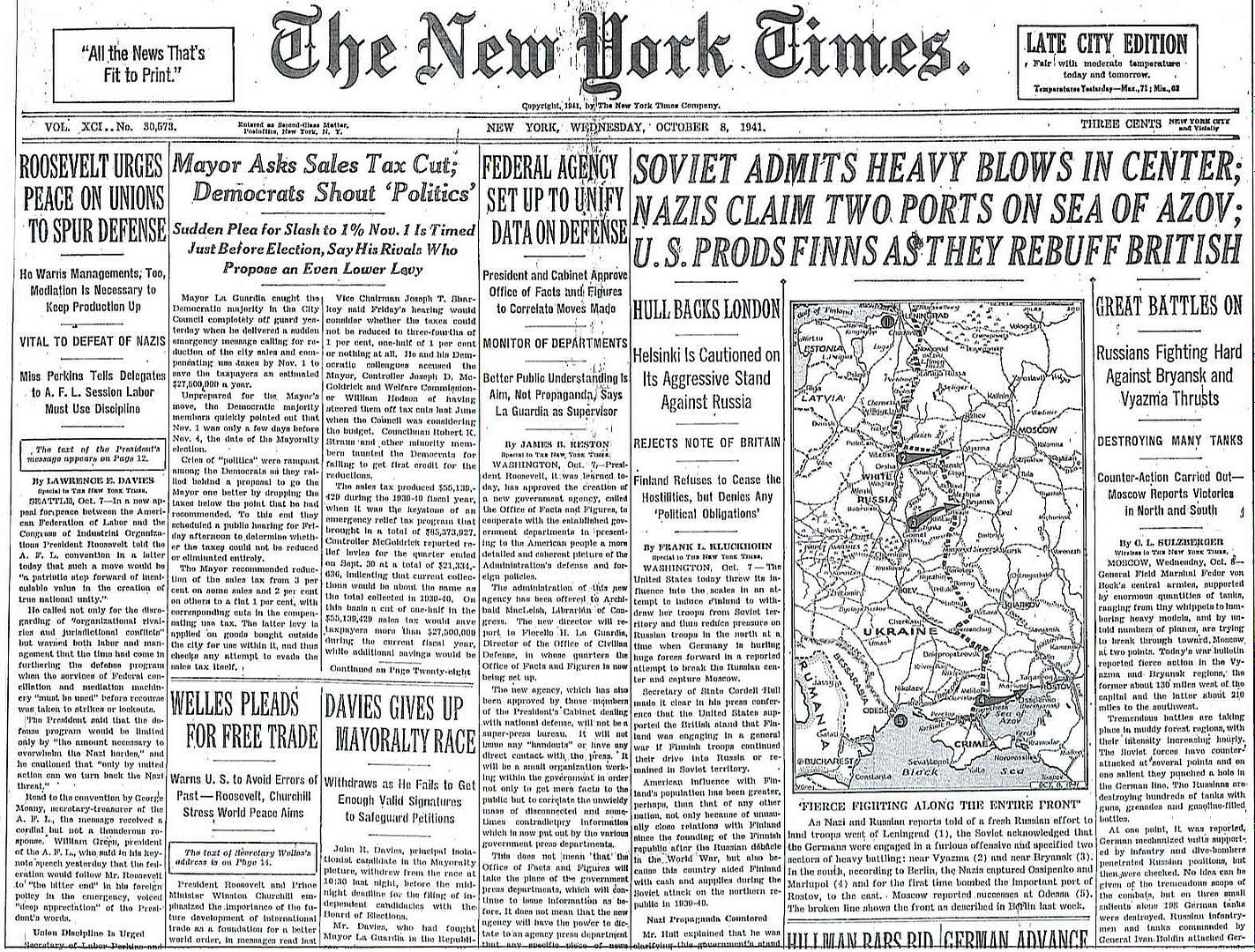
Posted on 10/08/2011 5:21:48 AM PDT by Homer_J_Simpson

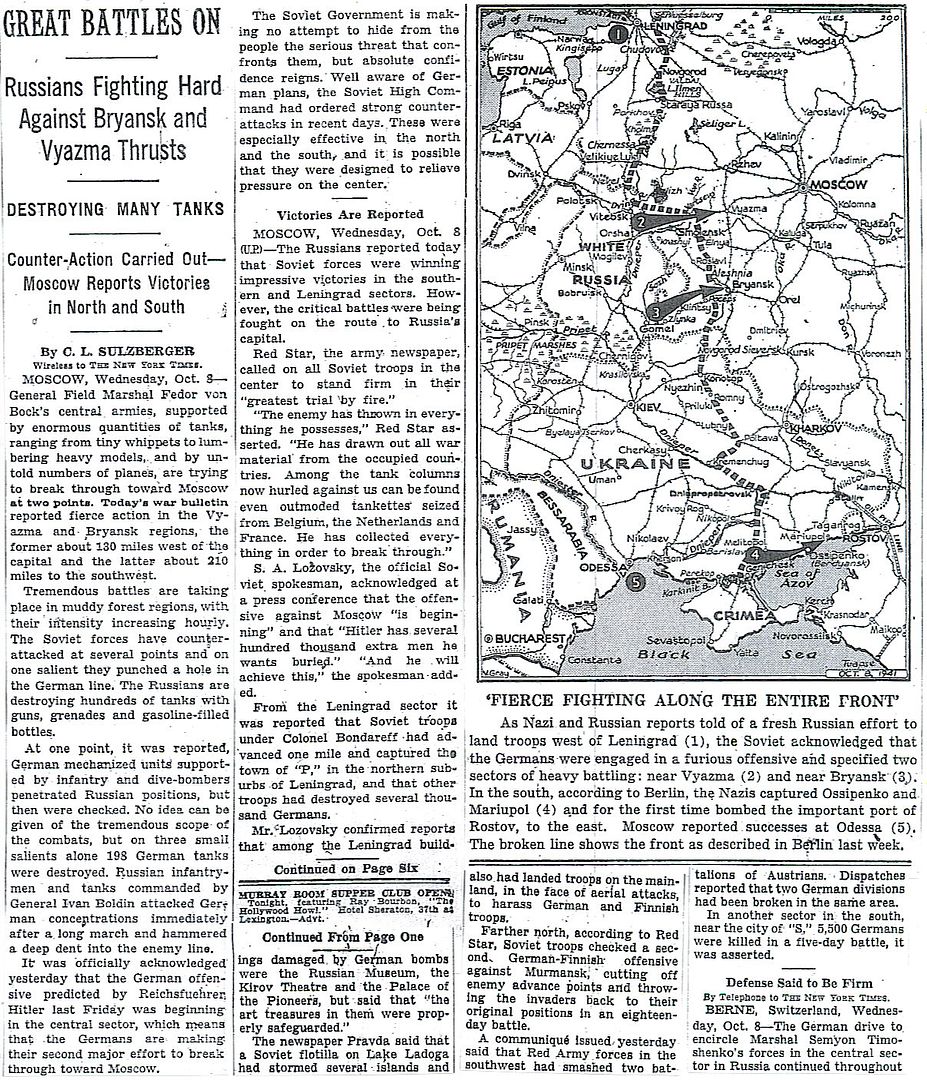
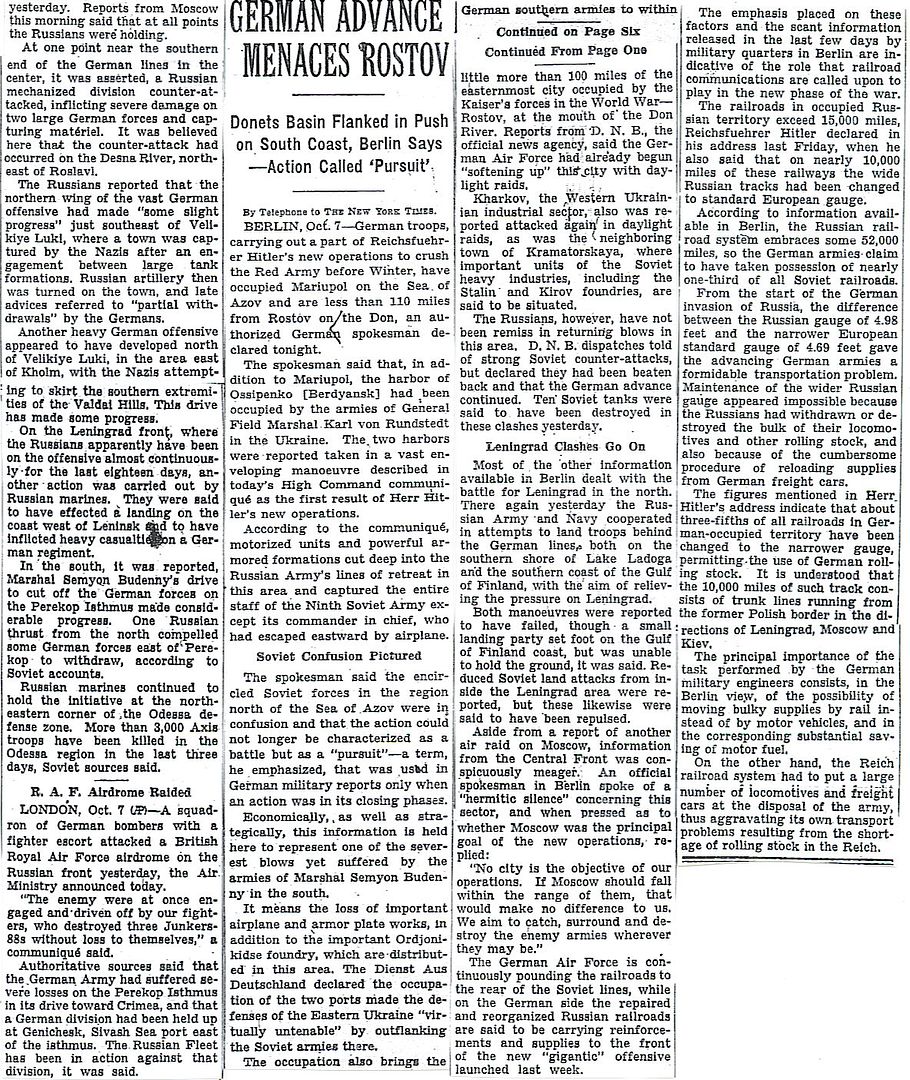
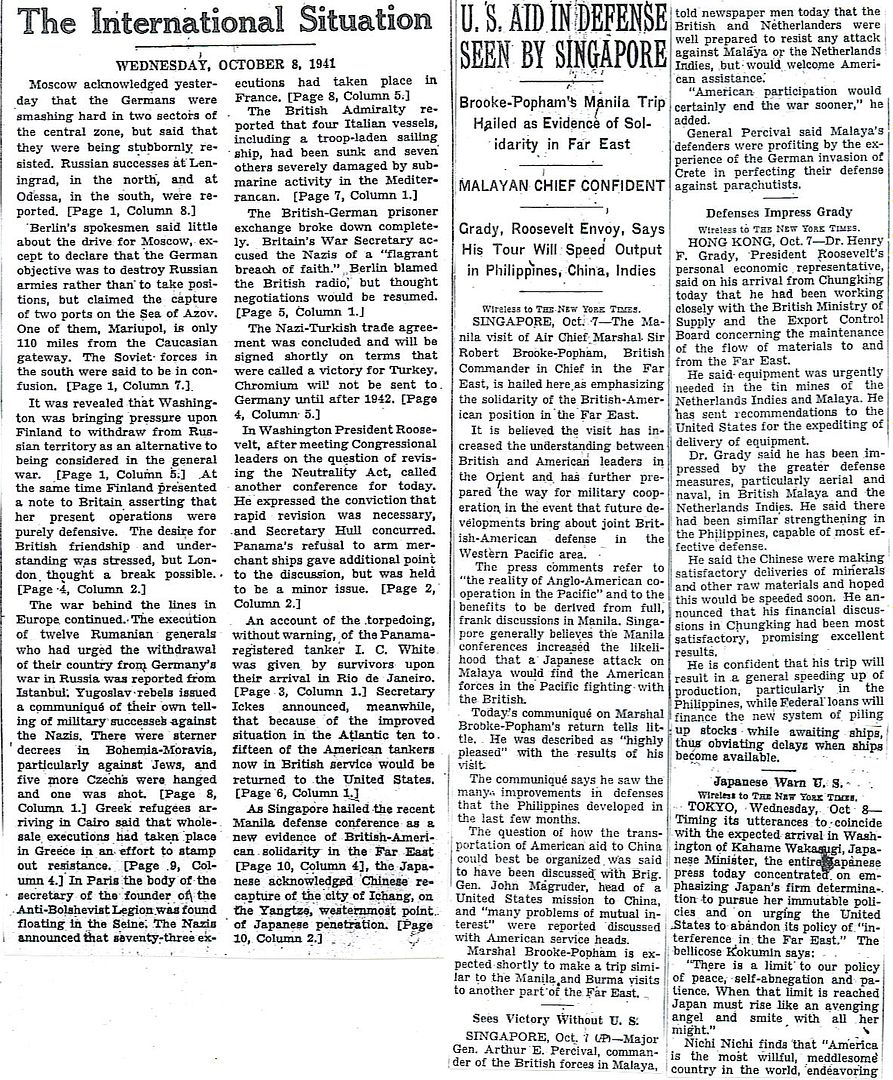
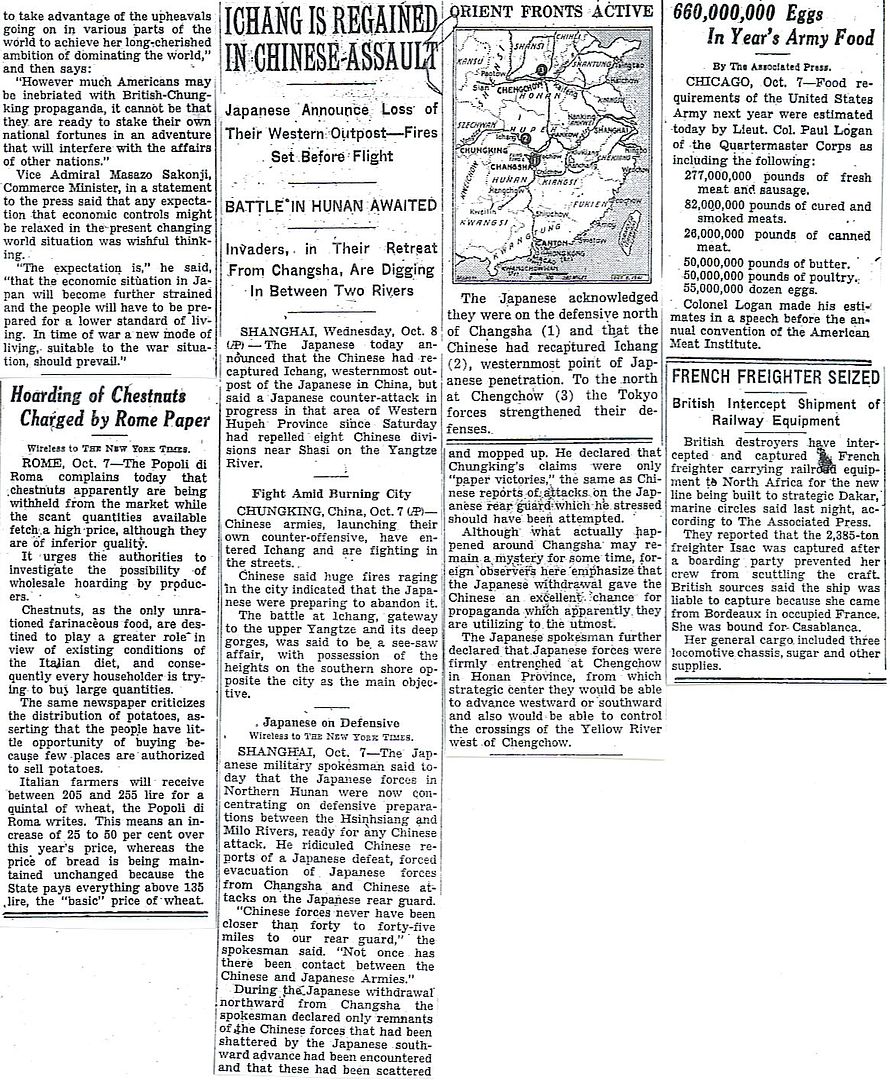
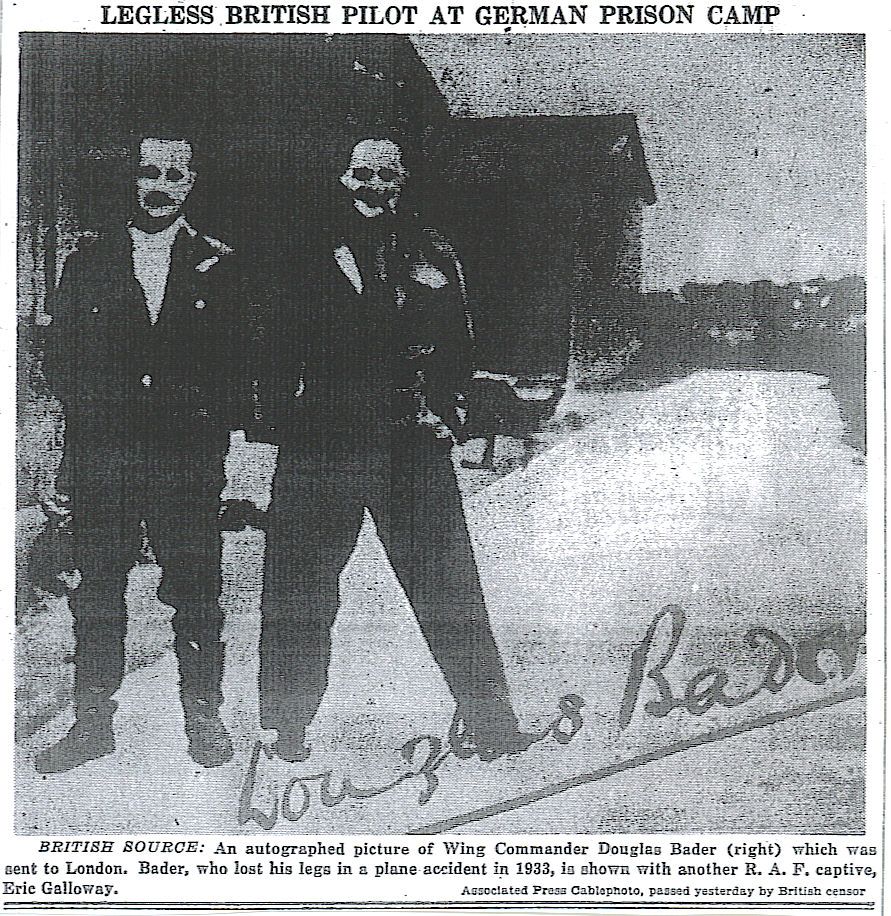
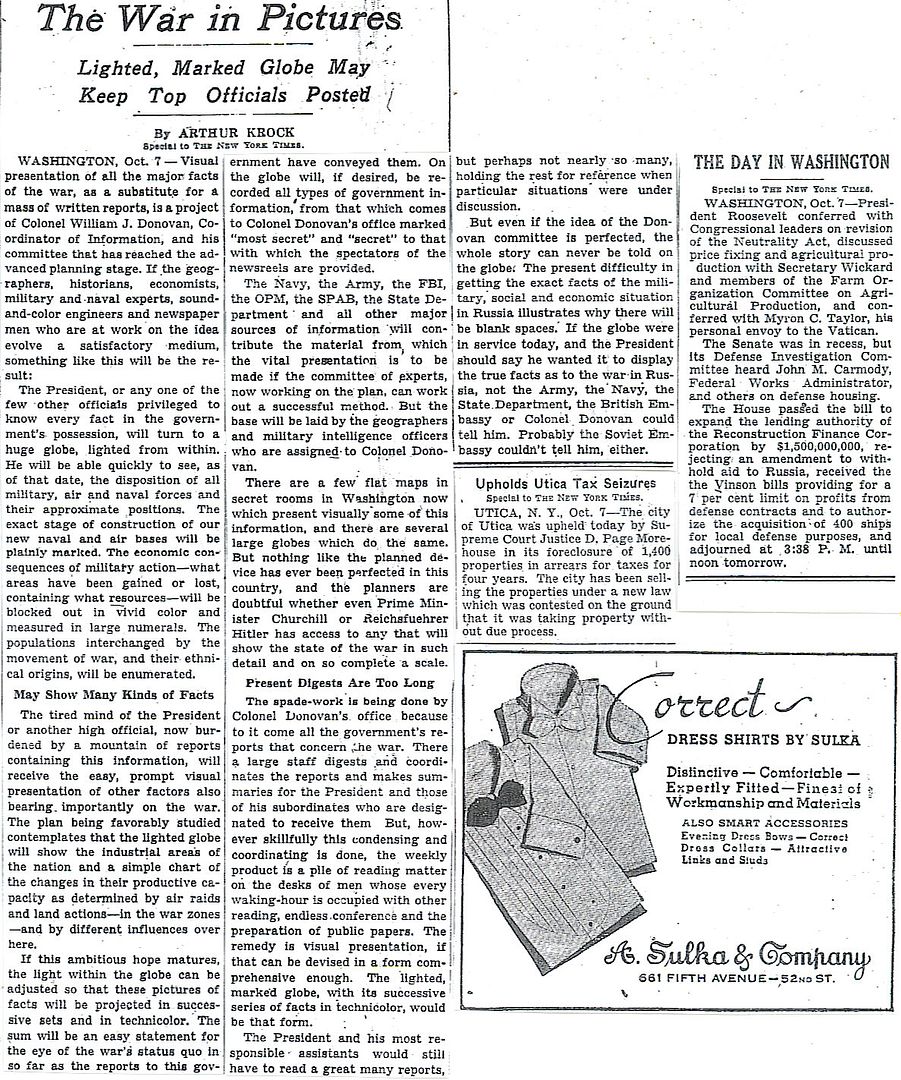
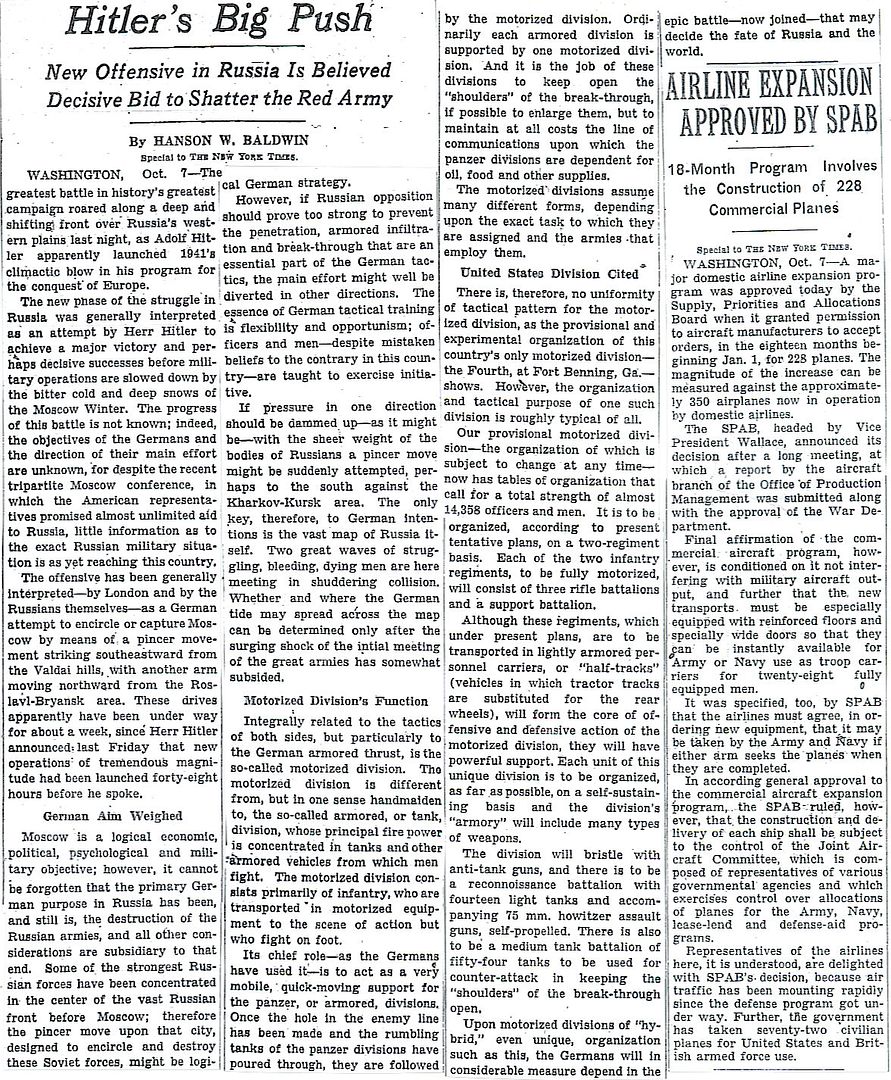
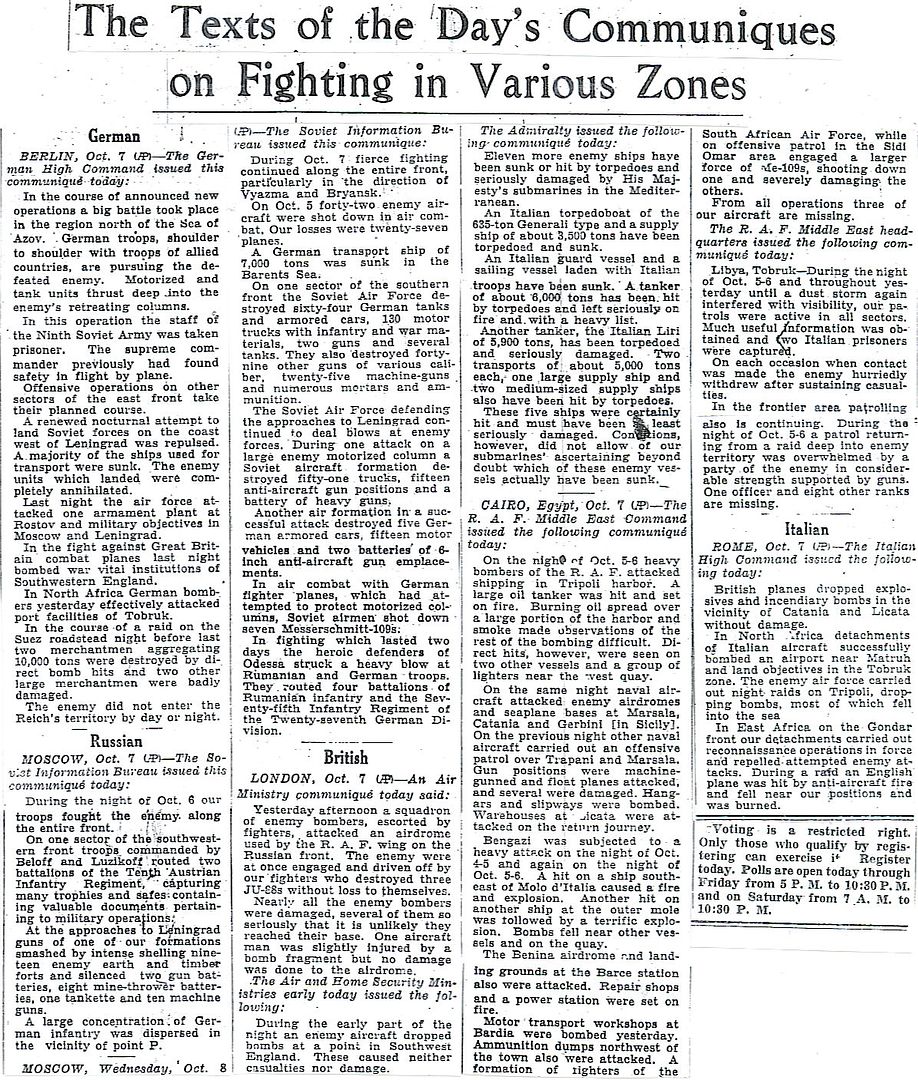
* This could mark the beginning of a new series of columns similar in format to those of Hanson W. Baldwin. Arthur Krock is the analyst in this case, and the area covered could be the political side of the war, or the home front, or some blend of topics. We will watch and see. I believe I saved two or three of them from October, which is as far as I have gone so far. - Homer
http://www.onwar.com/chrono/1941/oct41/f08oct41.htm
Rain slows German onslaught
Wednesday, October 8, 1941 www.onwar.com
On the Eastern Front... The German forces take Mariupol on the Sea of Azov, the entrapment of troops near Vyazma and Bryansk continue. German advances in the northeast are now towards Rzhev and Kalinin and in the south toward Tula and Kaluga. The autumn rains begin and the heavy rainfall begins to slow the rapid German mobile advance.
http://homepage.ntlworld.com/andrew.etherington/month/thismonth/08.htm
October 8th, 1941
UNITED KINGDOM: Destroyer HMS Loyal launched.
Destroyer HMS Onslow commissioned. (Dave Shirlaw)
GERMANY:
U-255 launched.
U-507 and U-657 commissioned. (Dave Shirlaw)
ITALY: Rome: Mussolini calls on the Japanese to pull their weight in the Axis by waging war on Britain.
U.S.S.R.: The Germans capture Mariupol on the Sea of Azov. The battles to close the pincers on Vyazma and Bryansk continue. 600,000 Soviet troops will eventually be captured along with their equipment.
CHINA: Chinese troops arrive outside Yuezhou, ending the second battle of Changsha.
NEWFOUNDLAND: Corvette HMCS Camrose departed St. John’s for Iceland for Convoy SC-48. (Dave Shirlaw)
U.S.A.: President Franklin D. Roosevelt sends a letter to the Soviet Union premier Joseph Stalin stating that “I am confident that ways will be found to provide the material and supplies necessary to fight Hitler on all fronts, including your own.” (Jack McKillop)
ATLANTIC OCEAN:
U-83 fired three torpedoes at a convoy escort, but all three missed.
U-573 fired three torpedoes at a freighter, but all three missed. (Dave Shirlaw)
"The Vitebsk (Belorussia) Ghetto is liquidated; more than 16,000 Jews are killed."
"Father Bernhard Lichtenberg was a German Catholic priest and activist based in Berlin at St. Hedwig's Cathedral.
He protested to the Nazi regime about the state-sanctioned "euthanasia" program, and exhorted his congregation to denounce the government's deportations of Jews to the East.
Lichtenberg was arrested in 1941.
When his apartment was searched, notes were found for an undelivered sermon in which he would have told his congregants that the Nazi government's claim that Jews wanted to destroy the German nation and its people was a lie.
He was sentenced to prison for a term of two years.
He was released in 1943 at age 68.
Lichtenberg subsequently was arrested by the Gestapo and sent to be interned at the Dachau concentration camp.
Ill from age and his earlier imprisonment, Father Lichtenberg died en route to the camp."
"FEDERAL AGENCY SET UP TO UNIFY DATA ON DEFENSEPresident and Cabinet Approve Office of Facts and Figures to Correlate Moves Made
MONITOR OF DEPARTMENTS
Better Public Understanding is Aim, not Propaganda, Says LaGuardia as Superviser"
Well, that is so comforting.
Wouldn't want to see any propaganda coming from our government. ;-)
Of course, that was then, this is now -- wonder whatever happened to that old Office of Facts & Figures?
Maybe unnecessary in this age of the big number zero?
The article asks, in effect, where are all those chestnuts?
And of course, most everyone in those days would know the obvious answer:
Great Britain has thrown them all in the fire, and the US will soon be called on to pull them out again.
;-)
Part Three- "an appalling battle"
Some historians have suggested that the Kessel or pocket battles “wore out” the Wehrmacht in a series of attritional battles but German losses during the battle of the Vyazma Pocket were not excessive. Colonel General Ruoff’s V Corps, for example, suffered 743 killed, 2,720 wounded and 88 missing during the period 2-14 October (a loss rate of about 7 percent). During the same period, V Corps captured 19,882 prisoners, 133 tanks, 322 artillery pieces and six Katyusha multiple rocket launchers. At the conclusion of the Vyazma fighting, V Corps still had almost 80 percent of its personnel. Furthermore, German equipment losses during the Vyazma fighting were negligible.
Beginning on 8th October, both side took the opportunity to re-evaluate the campaign.
The German OKH was astounded by the ease with which the Soviet fronts had been broken and some officers believed that it was time to revise Typhoon’s goals.
The original objective - encirclement and destruction of the Soviet Western and Bryansk Fronts- had been achieved. What now?
Given the huge Soviet losses a few weeks before at Kiev, it now seemed to the OKH that the collapse of the Soviet Union was imminent.
Soviet resistance in front of Army Group Center was now virtually nonexistent.
Colonel General Franz Halder, the OKH chief, advocated using this golden opportunity to roll up the Soviet Northwestern and Southwestern Fronts, and then take Moscow.
The scale of the impending Vyazma-Bryansk victories impressed Hitler and he allowed the OKH to issue a number of operational directives directly to Von Bock. The Ninth Army and Third Panzer Army were directed to send strong forces towards Rzhev and then Kalinin in order to cause this remaining fragment of the Soviet line to collapse. In the South, Guderian was ordered to send his XLVIII Panzer Corps towards Kursk.
Obviously. the enticing vision of easily overrunning more Soviet cities was driving the OKH, but these changes served to significantly dilute Army Group Centre's main effort.
Borodino
The German pursuit began in fits and starts, even before the Vyazma Pocket had been fully crushed. Obergruppenfuhrer Paul Hausser’s SS Reich Division from XL Panzer Corp was the only major German Motorized unit that was not involved in the Vyazma fighting and it was ordered to push eastward down the Minsk-Moscow Highway. Since Reich was relatively weak in anti-tank capability a Kampfgruppe from 10th Panzer Division was duly dispatched to assist him.
Eventually, they reached Borodino
At Borodino the regiments of the "Reich" SS Infantry Division and the "Hauenschild Brigade" of 10th Panzer Division had their first encounter with the Siberians
They were tall, burly fellows in long great-coats, with fur caps on their heads and high fur boots. They were most generously equipped with anti-aircraft and anti-tank guns, but even more so with the dangerous (and hated) 7.62-cm. multi-purpose gun nicknamed by the German troopers the "Crash Boom."
The Siberians fought impassively.
They never panicked.
They stood fast and held on.
And they killed and let themselves be killed.
It was an appalling and a terrible battle between these elite units of Hitler and Stalin.
The Russians employed their multiple mortars, the "Katyushas," known to the German forces as "Stalin's organ-pipes," which invariably caused havoc by their high-fragmentation effect.
At Borodino also the heavy T-34 tanks were used for the first time in massed formations. Since 8.8-cm. anti-aircraft guns were not always available, the infantry often had to tackle the T-34s with high-explosive charges. More than once the outcome of the battle hung in the balance.
The casualties suffered by the "Reich " Motorized SS Infantry Division were so alarmingly high that its 3rd Infantry Regiment had to be disbanded and the survivors divided up between the "Deutschland " and "Der Fuehrer " Regiments.
The entire army artillery available on the sector of the Panzer Group was concentrated under the command of the artillery commander 128th Division, Colonel Weidling, with instructions to blast a hole through the Soviet defenses for the Waffen SS grenadiers, who charged with death-defying courage.
First, the flamethrower batteries with their remote-control electric firing devices had to be taken. Then came the minefields. Then the barbed wire. Then the pill-boxes. Experienced assault parties under-ran the defensive fire of massed anti-aircraft, anti-tank, and mortar batteries and repulsed immediate counter-attacks by Russian tanks in close combat.
Hell was let loose.
Overhead roared the Soviet low-level bombers. German fighters of VIII Air Corps tore in and out of the billowing clouds of smoke.
The dressing stations were overflowing with wounded, dead and dying. Lieutenant-General Hausser, the commander of the "Reich " SS Infantry Division, was seriously wounded. Row upon row of injured lay on the ground—the tank-men in their black uniforms, the grenadiers in torn field tunics, the men of the Waffen SS in their blotchy camouflage smocks.
Dead, gravely wounded, burnt, or beaten to death. Anger, rage and hatred had made the troops see red—on both sides. No quarter was given.
At last a breach was torn through a strong-point held by the Siberians.
The two infantry regiments of the "Reich" SS Division, the "Deutschland" and "Der Fuehrer" Regiments, charged through.
There was no time to fire their guns. Spades and rifle-butts were the weapons used. The Siberian batteries were taken from the rear. Their crews, behind the breastworks of anti-aircraft, anti-tank, and machine-guns resisted stubbornly and were cut down in hand-to-hand combat. The infantry regiments of 10th Panzer Division were engaged in the same bloody battle. They fought on the battlefields where Napoleon had stood 130 years before them; they stormed the stubbornly defended historic scarp of Semenovskoye.
The Siberians resisted in vain.
The 32nd Siberian Rifle Division died on the hills of Borodino along with countless young Germans who barely three months earlier had crossed the threshold into this dreadful land with such high expectations in their mission.
The great bolt of Moscow's first line of defense on the Moscow highway had been blasted open.
The 10th Panzer Division and the "Reich" Division advanced across snow covered fields towards the Moskva. There the last resistance of the Russian combat groups was broken.
On 19th October 1941 Mozhaysk fell.
Mozhaysk—right outside the gates of Moscow!
A mere 60 miles of motor highway.
And that highway led straight from Mozhaysk into the Soviet capital.
"Mozhaysk has fallen!"
The news spread through the streets of Moscow.
"Mozhaysk has fallen. The Germanski are coming."
Clouds of smoke were rising from the Kremlin chimneys, just as though the outside temperature was 30 degrees below zero Centigrade.
They were burning the secret papers which they could not evacuate. The Muscovites were flabbergasted. Only a fortnight previously they had been full of confidence in victory in view of America's promises of help. On 2nd October Churchill's representative, Lord Beaverbrook, and Roosevelt's representative, Mr. Harriman, had gone to the Kremlin to sign the protocol on Anglo-American arms deliveries. Although the United States of America was still neutral and a noncombatant, it was announced that the three Great Powers were determined to cooperate towards victory over the German arch-enemy of all nations.
For the first ten months of the agreement, starting with 1st October, the following supplies were promised and also delivered:
3000 aircraft-2000 more than the total number of operational machines available to the Luftwaffe on the Eastern Front on 30th September-4000 tanks-three times as many as all three German Panzer Groups had at their disposal on 30th September-and 30,000 motor vehicles.
On 15th October, Foreign Minister Molotov received the US Ambassador, Steinhardt, and informed him that the whole Government, with the exception of Stalin, were leaving Moscow, and that the Diplomatic Corps was being evacuated to Kuybyshev, 525 miles east of Moscow. Each person was allowed only as much luggage as he or she could carry.
When the news spread through the city, and in particular when it became known that Lenin's coffin had been removed from the Mausoleum in Red Square, panic broke out.
"The Germans are coming!"
Those who lived on the Mozhaysk Road in Moscow pricked up their ears at any noise that sounded like tanks.
Had they got here already? Anything was considered possible in Moscow at that time.
Cities have nerves too.
And if the strain on them becomes too much they give way. On 19th October 1941 Moscow's nerves were strung to breaking-point. Alarmist rumors were flying about the city. The Government had fled. The Diplomatic Corps had left Moscow. Lenin's coffin, the glass coffin with the father of the Revolution, had been removed to an unknown destination. And the postscript to all these stories and rumors was: "The Germans are already outside the city."
And in a whisper they added, "Their tanks might be here any minute now."
The possibility of this happening had the most astonishing effect on the population. The people suddenly lost their fear of Stalin's secret police, the militia, and the security detachments. There was a rumble of angry voices in the bread queues outside the bakers' shops: "We've had enough of the war—put an end to it!"
Presently the first shop was stormed in Sadovaya Street.
A lorry loaded with tinned food was ransacked, overturned, and set on fire.
Rebellion was lurking in the dank, cold streets, cowering in ill-heated flats, sharing the table of starving people. Stalin's power was tottering. His portrait was being removed from the walls; the first Party cards were being burnt.
Handbills, crude hurriedly printed sheets, suddenly appeared in people's letter-boxes in the morning: "Death to the Communists!" they said. They also contained anti-Semitic slogans. Horrified, the recipients stared at the seditious text. Moscow, Mother Moscow, was reeling. The .heart of the Soviet Union was missing a beat.
Yet the skies had not fallen.
And the Germans had not come.
Why not? After all, they had been seen crossing the motor highway and the Mozhaysk road on the approaches to Moscow—roughly half an hour's drive from the city. Where were they?
Lieutenant-Colonel Wagner had spread out his map on a case of hand-grenades. The officers of the Engineers Battalion, 19th Panzer Division, were standing around their commander. "Here"—Wagner indicated a spot on the map—"here is Maloyaroslavets, 12 miles ahead. That's where our tanks have to get by to-morrow. And here, Podolsk, 21 miles from Moscow, is the division's target for next week."
Wagner looked up from the map: "That's why we must break through this damned pillbox position in front of us and open up the road. The tanks can't drive over the sodden fields, and the infantry who have pushed ahead south of the road are in need of supplies."
The date was 16th October. The scene was outside Ilyinskoye, the kingpin of the first line of defense before Moscow.
The Soviet positions were held by the cadets of the Podolsk Military College. The 19th Panzer Division from Lower Saxony had got pinned down in front of these Soviet pillboxes, manned by officer cadets, young fanatical Communists. The Stukas had been unable to smash the pillboxes. The gunners had been no more successful.
It was therefore up to Wagner's sappers now.
An assault party with two flame-throwers and high-explosive charges cautiously filtered into the flat, swampy terrain in front of the Russian lines. Bomb and shell craters provided useful cover. The German artillery put down a heavy barrage immediately in front of the Russian pillboxes. Under its cover the sappers crept right up to the concrete blocks.
The shellbursts was uncomfortably close in front of them. Sergeant Tripp, leading a section of the Engineers Battalion, 19th Panzer Division, was flattening himself against the edge of a shellhole. He raised his Very pistol. One white flare went up—the arranged signal. It meant: Have reached objective. Abruptly the artillery-fire ceased.
"Now!" The flame-throwers hurled their searing jets of burning oil against the two pillboxes in the middle and on the right. The fire roared through the embrasures. Black smoke blotted out everything. The Russians had no hope of firing small-arms or throwing hand-grenades. The pillbox on the left was kept down by machine-pistol fire on the embrasures, while Lance-Corporal Vogel climbed up on its top. From above he shoved his charge through the embrasure and leapt back. There was a loud crash, a sheet of flame, and black smoke.
The second obstacle was reduced in much the same way. But then, from the concrete passage linking the pillboxes, came sudden machine-gun fire. The flame-thrower party on the right was mown down. Tripp raced across to the communication trench from the left and opened up with his machine pistol. The Russians raised their hands.
Only the commissar continued to throw hand-grenade after hand-grenade until he was mown down. They fired another Very light—a white one. The infantry farther back cheered: "They've done it." The barrier of Ilyinskoye was breached.
The 27th Panzer Regiment under Lieutenant-Colonel Thomale, together with 2nd Battalion, 19th Artillery Regiment, and a battery of 8.8-cm. anti-aircraft guns, now moved off, and along the cleared road advanced towards Maloyaroslavets. In front was the 1st Company under First Lieutenant von Werthern. The companies of 74th Rifle Regiment were moving along either side of the highway.
It was 60 miles to Moscow.
The Protva river was crossed without difficulty. They kept moving. They were aiming at Verabyi on the Istya river.
The bridge was intact. The crossing was furiously defended by a Soviet anti-tank gun. "All weapons, fire—and get across that bridge," von Werthern radioed to his unit commanders.They had just cleared the bridge when a Soviet anti-tank gun, emplaced to the left of the steep bank, caught them. There was a crash, and the tank filled with smoke. "We're getting out!" Second Lieutenant Range ordered. They all managed to clamber out of the tank and leap into the ditch. They saw the second tank receive a direct hit and burst into flames. Only the commander got out.
But already the third was crossing the bridge, swiveling its turret to 10 o'clock and firing. A direct hit on the Soviet anti-tank gun. In the teeth of Russian artillery fire from the edge of the forest a tractor with an 8.8-cm. antiaircraft gun raced over the bridge. It went into position and at once opened fire at the Russian batteries. All right so far.
Werthern's 1st Company established a bridgehead in the face of furious Russian opposition. The Russian troops were officer cadets who fought with unbelievable bravery, time and again attacking the German tanks at close quarters.
Lieutenant-Colonel Thomale ferried over the bridge whatever parts of his 27th Panzer Regiment he could lay hands on. He was now 25 miles in front of his division, and the Istya bridgehead had to be held until the bulk of the troops came up. Thomale's combat group managed to do it. By nightfall the Russian position, built hastily during the past days but nevertheless held by strong anti-tank and artillery forces, was smashed.
The commander of 19th Panzer Division, Lieutenant-Général von Knobelsdorff, drove up to the spearhead. "We mustn't give the Russians time to dig in again," he said. "Keep going. The new objective is the Nara."
The Nara river marked the second, and presumably the last, line of defenses outside Moscow. A freezing rain was falling. It was cold with a bitter wind. The roads were getting muddier and muddier. The tanks were churning to a standstill. With increasing frequency the shout went up: "Russian tanks!" The T-34s struck down swiftly from the hills on their broad tracks. They were ideally constructed for mud and snow. Their toll of victims was heavy. Often it was only the 8.8-cm. antiaircraft guns which saved the situation at the last moment. Nevertheless, the motor-cycle units and tanks of 19th Panzer Division reached the Nara. They crossed it north of the highway after the sapper battalion had built a pontoon bridge overnight in record time, though under the costly fire of Soviet mortar batteries. Would it be possible to widen the breach into a dam burst?
In a surprise coup the tanks took the high ground east of the Nara.
"It's working!" the men were calling to one another. The 59th Rifle Regiment, 20th Panzer Division, temporarily subordinated to 19th.Panzer Division, was switched across the river. Everything now depended on the motor highway being reached and the strong barrier position between Gorki and Nikolskoye being smashed. The road to the Kremlin would then be open.
In spite of the soft roads the 98th Infantry Division had come up by forced marches. At Detchino it had fought its way through cunningly devised field positions and pillbox lines arranged in deep echelon and manned by Mongolians and Siberians.
These men took no prisoners because they had been told that the Germans would first cut off their ears and then shoot them. For five days the furious fighting raged.
The battalions suffered heavy casualties. The 282nd, 289th, and 290th Infantry Regiments were greatly reduced in number; most of the battalion and company commanders had been killed or wounded. The sapper battalion lost 100 men. But Moscow, the great objective, spurred the men on. True, the horses were finished. And so, for that matter, were the gunners and infantrymen.
To the severity of the fighting were now added the hardships of rain, cold, and lice. So far no winter clothing had arrived for the troops. But the knowledge that they were now fighting the decisive battle kept them going. They were giving the last, the very last, ounce of their strength.
On 23rd October the 290th Infantry Regiment crossed the Nara at Tarutino, south of the motor highway. The division instantly turned towards the north in order to give support to the 19th Panzer Division in clearing the Moscow highway.
The 1st and 2nd Battalions, 289th Infantry Regiment, under Lieutenant-Colonel von Bose and Captain Strôhlein respectively, stormed the thickly wooded hills outside Gorki. The Russians made an immediate counter-attack and dislodged the 289th Regiment again. On the following day the struggle continued. Every inch of ground had to be gained in bitter hand-to-hand fighting. In the end only 200 yards remained to the motor highway.
First Lieutenant Emmert, Acting O. C. 1st Battalion, 282nd Infantry Regiment, personally led the charge of his 1st Company. Its commander, Second Lieutenant Bauer, was killed at once. Men were dropping right and left. By a supreme effort the men reached the houses of Gorki and flung themselves down. The Russians fell back. True, the German troops were only in the southern part of the town, but at least they had got behind Moscow's last line of defense. From Gorki it was only 40 miles to Moscow.
" Forty miles-that's as far as from Nuremberg to Barnberg," remarked Second Lieutenant Frey, a troop commander in the Panzerjager Battalion, 198th Division.
But he himself managed only another three. His grave is just outside Gorki, at Kusolevo.
The offensive against Moscow was essentially a battle for the roads.
Throughout the summer they had been vital arteries for supplies. But now, during the period of winter mud, when no farm track, let alone rough ground, was negotiable, not only the movement of supplies but in fact all operations of tanks and infantry depended on road conditions. This was a serious handicap for the attacker, but a fortunate circumstance for the defenders. A road junction covered by pillboxes and field positions could only very rarely be bypassed. It had to be taken by frontal assault.
Thus the road junctions became the battlefields of the drive towards Moscow. Gorki on the Nara was one such junction, and so was Naro-Fominsk on the Smolensk-Kaluga-Moscow railway.
Krimskoye, between the Moscow motor highway and the famous postal road, was another. Other keypoints still were Zvenigorod, Istra, Dmitrov, Tula, and Kalinin, forming a large semicircle around Stalin's capital.
These localities represented the keypoints of Soviet opposition in Moscow's second line of defense: behind them with its numerous lines of communication lurked the Red capital like a spider in its web.
More than sixty German divisions were involved in the costly fighting for Moscow.
That meant sixty times an average of 5000 to 10,000 men. Every single division could deserve individual mention. But we can attempt to trace the fate of only a few—their fate along that terrible, murderous road full of human and military drama.
They came so near their aim that it seemed within arm's reach.
They saw the towers of the Kremlin; they stood at the bus-stops in the outer suburbs. One unit got within five miles of Moscow, and its tanks stood within nine to 18 miles of the Kremlin at the beginning of December 1941………….
To Be Continued- Von Kluge Fails To Support Typhoon
The Battle of Borodino...a battle fought in hell.
Thanks Homer and thanks Larry381
Disclaimer: Opinions posted on Free Republic are those of the individual posters and do not necessarily represent the opinion of Free Republic or its management. All materials posted herein are protected by copyright law and the exemption for fair use of copyrighted works.